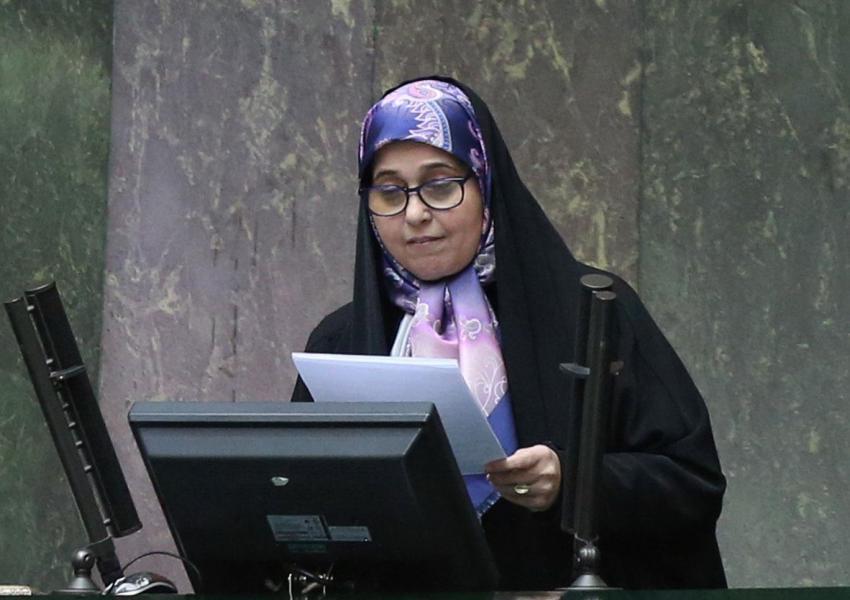
“End of the Republicanism” Announced at the Parliament
A fiery speech was already anticipated when Paravaneh Salahshouri, the representative of Tehran districts in the parliament, took to the podium on December 9. She had previously announced her refusal to run for a seat in the upcoming elections; however, what she said left everyone astonished.
Salahshouri’s speech on that cold December morning was unprecedented except, perhaps, in the first parliament after the revolution in 1979, or in the 6th parliament in 2000 when the reformists had an absolute majority of seats in the parliament.
She warned against the end of republicanism and criticized grim despotism. Dejected by the crackdown on protests in November, Salahshouri reiterated the citizens’ rights to protest and condemned the suppression of the people.
Her claim of the ‘end of republicanism’ calls for more attention and in-depth analysis.
The Islamic Republic was, above all, the product of theoretical and political patterns welcomed by fundamentalist Islamic thinkers from Egypt to the Indian subcontinent, after Mustafa Kemal Ataturk dissolved the Caliphate in 1924.
As a theocratic state based on clerical oligarchy, the Islamic Republic was more an imported project influenced by Muslim Brotherhood’s thinkers such as Rashid Rida and Hasan al-Banna and less so by Iranian Islamic intellectuals.
Based on the ideology of the Muslim Brotherhood, as the main branch of Islamism in the Arab world, and the subcontinental Islamists such as Abul A’la Maududi, democracy and republicanism were not only blasphemous for putting an end to the caliphate, but they were also deemed sacrilegious because they embodied the fulfillment of Man’s will noncontingent upon the Sharia, which is the fulfillment of the Divine will.
Furthermore, contemporary Islamists had to face another issue called Democracy and define it in affirmative or negative propositions.
According to the Muslim Brotherhood’s ideology, the ideal state accepted republicanism superficially while, in reality, it was based on the Sharia; rather than the citizens’, the will of the Caliph, the executive power of the Sharia, ruled the state.
Inspired by Sunni Islamists, Shiite Islamists took up this pattern and established the Islamic Republic which was a republic merely on the surface but effectively a caliphate. A similar example is what came to be known as the ‘Islamic State of Iraq and the Levant’.
In this way, a state was formed which was theocratic in nature, but on the surface, had a republican form as it had introduced electoral institutions to its constitution which were inferior to and controlled by a caliphal power.
As many outspoken Islamists, such as Mesbah Yazdi, have acknowledged, the goal of the Islamic Republic was not a republic but an Islamic State. Like an extra limb that grew on the body of the Islamic State, republicanism was utilized during the first days of the revolution as an emergency strategy to convince the Iranian society, as it was much more modern compared to societies where these Islamic ideas generated, such as the Arab world and the Indian subcontinent. This extra limb is to be cut off from the body of the state whenever it is powerful enough, so that an absolute Islamic State whose source of legitimacy is not the people but the Divine power, can come into force.
I believe this framework, i.e. the caliphal vs. republican form of the state, can very well explain the important events that took place in the recent decades, such as obstructing the effective influence of Mahdi Bazargan and his subsequent resignation, impeaching Abolhasan Banisadr, who was the first President of the Islamic Republic; Khomeini’s support of Mousavi who was then the Prime Minister and was to be dimissed by Khamenei, who was the president; Khamenei’s ‘social justice vs. development and construction’, which embodied his conflicts with President Hashemi Rafsanjani; Khamenei’s ‘economic development vs. political development and democracy’ which embodied his conflicts with President Khatami; Khamenei’s conflicts with Mahmoud Ahmadi Nejad over a claim on social justice; and finally Khamenei’s conflicts with Hassan Rouhani regarding the West’s infiltration in the regime.
In this theocratic structure, which gets its legitimacy from God and has the highest public support in the regime’s mainstream media, elections candidates are filtered through ‘approbation supervision’ which is controlled by the caliphal system. The structure of the regime is essentially formed in a way that the republican institutions lack any meaningful functions and are inferior to the caliphal nature of the regime.
This is the reason why the more realistic reformists at the beginning of the reform movement, came to the conclusion that the regime’s structure does not allow for any form of democracy and because they did not want to opt for deconstructing alternatives, they resorted to ‘the return to the civil society and leaving the state structure behind’.
Now, Salahshouri is facing a similar historic dilemma that a great majority of the 6th parliament’s representatives had. One side of this dilemma is representing the society in a parliament with no independence and on the other, lies protesting to a deeply dishonest structure that uses the title 'republic' for its caliphal purposes. Salahshouri turned her back on the advantages of being a part of this show and rebelled against this charlatanism and bravely did what Edward Said calls the responsibility of an intellectual: “speaking truth to power”.









